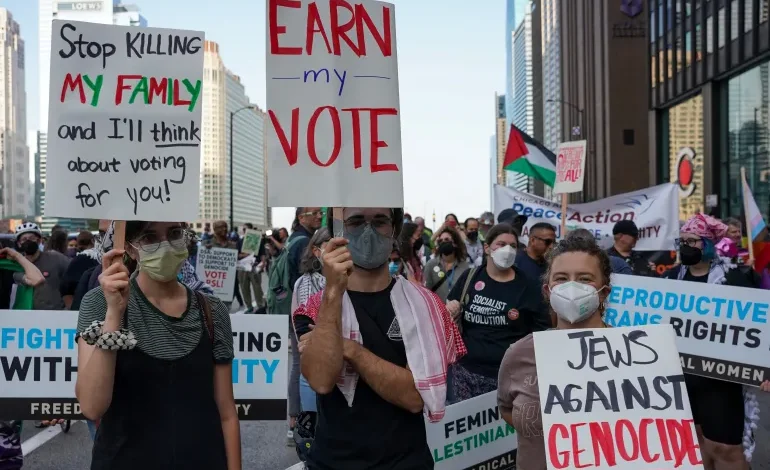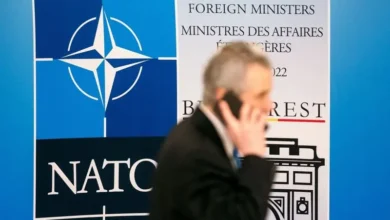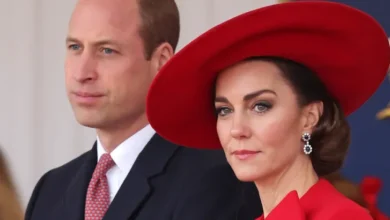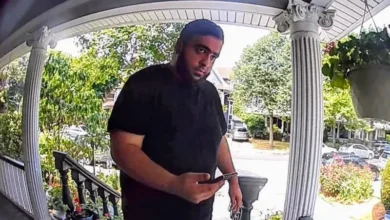Why I am not voting for Kamala Harris

I registered to vote in 1998, and I have voted Democrat ever since. I have not always felt good about the candidates on the Democratic ticket. In fact, I have usually felt angry, disillusioned, disappointed and dirty after casting my vote. Still, it felt like part of the job of being a citizen of a pseudo-democracy. It was not the only work to be done, but it was something.
This November, however, I plan not to vote for the Democrats in the election. If the party’s presidential candidate, Kamala Harris, does not change her policy on Israel, I will not be casting a ballot for her.
And I will not be the only one. More than 700,000 Americans have cast an “uncommitted” vote in the Democratic primaries, demonstrating their rejection of the Democratic Party’s “ironclad” support for Israel.
If Harris wants the progressive vote, she has to support an arms embargo on Israel and stop funding the Israeli genocide of Palestinians in Gaza. This is a red line for many of us who have not bought into her liberal cult of personality.
When President Joe Biden finally dropped out as the 2024 Democratic nominee on July 21, I was not one of the many people celebrating his endorsement of the vice president. Harris was on the wrong side of history as San Francisco’s district attorney when she opposed criminal justice reform, and she has been on the wrong side of history in regards to Israel, which she is a staunch supporter of.
Still, a small part of me hoped she would be savvy enough to understand the power of the “uncommitted” movement – which is conditioning voting on support for an embargo on Israel and a permanent ceasefire in Gaza – and the level of outrage felt by those opposed to the ongoing genocide, funded these past 10 months by US aid. I was wrong.
At a rally in Detroit on August 7, Harris was met by a group of anti-genocide, pro-Palestine protesters chanting, “Kamala, Kamala, you can’t hide! We won’t vote for genocide!” In a democracy, this is a perfectly reasonable and acceptable (if not necessary) action. Politicians serve the people, and the people have the right (and the responsibility) to make demands on their political leaders, especially when the latter are asking for their votes and campaign donations.
Yet Harris decided to respond: “You know what? If you want Donald Trump to win, then say that. Otherwise, I’m speaking.”
What purpose does this attitude serve? The protesters were merely expressing their demand that Harris pledge to stop arming Israel amid its genocidal war on Gaza. A war that has brought the official death toll in Gaza to more than 40,000; some estimates project that number to reach 186,000 or even higher. A war that has put one million children at risk of famine, according to the international nonprofit organisation Save the Children. A war that has decimated Gaza’s health sector, bringing back polio infections for the first time in 25 years.
Many of us spend our days scrolling through the most horrific images imaginable – toddlers beheaded by Israeli air strikes, people burned alive in their tents, emaciated children who die of starvation, political prisoners brutally raped by Israeli soldiers. The atrocities go on and on. My days and nights are haunted by these images, and none of this would be possible without US aid, without our tax dollars.
But Harris doesn’t want to engage these very reasonable demands – to stop funding this slaughter, this genocide, this horrific violence. Instead, she wants to be celebrated for being charismatic, for her affect, for her vibes.
This politics-as-vibes is not new. It is nothing more than celebrity culture bleeding into politics. Another word for it is fascism.
I am reminded of Erik Larson’s 2011 book In the Garden of Beasts: Love, Terror, and an American Family in Hitler’s Berlin, which tells the story of William Dodd, the US ambassador to Germany from 1933 to 1937 and his family. Over the years since the book was published, I have thought occasionally of Dodd and often of his daughter, Martha, who accompanied him to Berlin.
The ambassador was chairman of the history department at the University of Chicago at the time of his appointment, and he just wanted to be left alone to finish his book about the antebellum American South. He was somewhat concerned but not too alarmed about what was happening in Germany, telling President Franklin Roosevelt, “Give men a chance to try their schemes” as the Nazi Party prepared to deny Jews citizenship.
Martha, on the other hand, was swept up by the “glamour” of the Nazi Party and its social scene, dating and sleeping with Nazi officers.
So many liberals I know are a form of William or Martha Dodd. Like William, they are either too consumed with their own comfort to care too much about the daily atrocities experienced and endured by Palestinians, or, like Martha, they approach politics through the frame of celebrity culture and good feelings, happy to fangirl Harris, whose charisma and Beyonce-scored inspire-ads overwhelm the pesky reality of genocide.
This is, after all, about feeling good. “Don’t spoil our fun!” they scream at me (and so many others) on social media. This anti-outrage is deafening. But you cannot just live off vibes.
In a memoir written a few years after she left Nazi Germany, Martha admitted to just not really liking Jews all that much. This casual anti-Semitism foreshadows today’s liberal attitudes towards Palestinians, a disregard rooted in Islamophobia and anti-Arab racism, which is driving a genocide.










